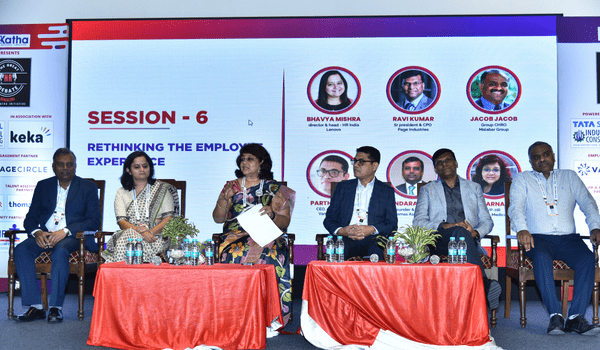With time, the focus of businesses has shifted from simply providing a pay cheque to their employees to creating a positive employee experience.
This shift has been driven by the recognition that happy, engaged employees are more productive, more likely to stay with the company, and can lead to increased profits. However, as the pandemic has transformed the way we work, it’s time to rethink what employee experience means and how we can create a good one.
“It is essential to understand the importance of valuing and respecting employees, as they play a critical role in the success of any business.”
Aparna C, lead human resource, Akna Medical
Aparna C, lead human resource, Akna Medical, started off by sharing a quote: “Always treat your employees exactly as you want them to treat your best customers.”
She went on to explain how this statement highlights the importance of valuing and respecting employees, as they play a critical role in the success of any business.
In today’s highly competitive job market, companies are realising that creating a positive employee experience is more important than ever. It’s not just about offering competitive salaries and benefits; it’s also about developing a unique and compelling story that sets the organisation apart from others. This story is not only shared with current employees but also with potential candidates to attract the best talent.
“The goal is to stand out in the market by offering a different and appealing story to potential employees, who now have more choices than ever before,”
Jacob Jacob, CHRO, Malabar Group
To create this story, companies are rethinking their approach to employee experience, focusing on customising experiences for different skill sets within the organisation. This means, creating an environment that supports individual growth and development and providing opportunities for employees to learn and improve their skills.
It also means fostering an emotional connection between employees and the organisation, which can lead to increased engagement and retention.
Jacob Jacob, CHRO, Malabar Group, drew attention to the fact that many companies are currently reassessing their approach to employee experience as it has become a crucial factor in attracting talent. As part of their efforts, they are developing a unique and compelling story that can be shared with potential candidates, and also customising experiences for different skill sets within the organisation.
He also adds, “The employer value proposition is made up of the entire organisational story, including the products and services offered. The competition to attract the best talent has increased, leading companies to focus less on infrastructure, policies and processes and more on creating emotional connections with employees.”
“The goal is to stand out in the market by offering a different and appealing story to potential employees, who now have more choices than ever before,” opinedJacob.
How does the employee experience constantly change?
“Our employees have different pay structures and work in specialised communities. Therefore, we ensure they are aware of the specific benefits and opportunities available to them.”
Ravi Kumar, senior president and chief people officer, Page Industries
Talking about employee experience in a manufacturing unit, Ravi Kumar, senior president and chief people officer, Page Industries, talked about how their company believes in customising the employee experience not just as a welfare activity, but also as a win-win for management. To achieve this, they have implemented a programme called cross-pollination that allows employees to experience different roles across retail and manufacturing.
They have also come up with specialised roles for manufacturing, such as visual merchandising and technology-related positions. In addition, they provide opportunities for designing integrated products.
Kumar added, “Our employees have different pay structures and work in specialised communities. Therefore, we ensure they are aware of the specific benefits and opportunities available to them.”
Sundara Rajan, founder and director, Thomas Assessments India and Market Search India, said, “Over time, people’s expectations of their experiences have changed, and this is largely due to changes in culture and society.”
“Over time, people’s expectations of their experiences have changed, and this is largely due to changes in culture and society.”
Sundara Rajan, founder and director, Thomas Assessments India and Market Search India
By consistently receiving small doses of positivity, employees are encouraged to continue doing good work, which creates a virtuous cycle of productivity and satisfaction.
“Things were different 10 years ago, when recognition was typically given on a quarterly basis or even less frequently. Now, employees crave more immediate recognition and feedback, which can help them feel valued and appreciated. Ultimately, this shift in expectations is a positive change that can help businesses foster more engaged and motivated teams,” pointed out Ranjan.
Bhavya Misra, director and head of HR, Lenovo, was of the opinion that the fundamentals of creating a positive experience remain the same across different types of interactions, whether they’re with customers, partners, or employees.
According to Misra, the first component is to ensure that policies and processes are aligned and consistent, which is critical from an HR perspective. “Even though these policies may be common across different organisations, they still play a fundamental role in shaping the experience,” she pointed out.
The second component is to have a clear vision and purpose behind these policies and processes. “This gives employees a sense of direction and helps them understand how their work contributes to the overall mission of the organisation,” explained Misra.
“The fundamentals of creating a positive experience remain the same across different types of interactions, whether they’re with customers, partners, or employees.”
Bhavya Misra, director and head of HR, Lenovo
Pre-pandemic vs post-pandemic employee experience
During the pandemic, the demand for digitalisation in HR increased drastically, just like the demand for Lenovo or pharmaceutical products.
Partha Neog, founder and CEO, Vantage Circle, admitted that around 70 per cent of their staff are 30-year-olds, who were recruited and onboarded remotely.
“Initially, after the first wave of the pandemic, some employees wanted to return to the office, but with the second wave, the majority preferred to continue working remotely. We had to explain to them the reasons why we wanted them to come to the office and also the context of our industry,” shared Neog.
The pandemic has accelerated the need for companies to rethink their approach to employee experience. With many employees working remotely, the traditional office-based experience is no longer applicable.
Instead, companies need to focus on providing a flexible and supportive experience that meets employees’ needs, wherever they are located.
Neog revealed how in December 2021, when they asked everyone to come to the office, although the younger generation questioned the need for physical attendance, they explained the importance of being together and the benefits that it brought.
The first step in rethinking the employee experience is to assess what employees need in the current climate. For many employees, this may include flexible working arrangements, access to mental health support, and clear communication about company policies and changes. Companies need to listen to their employees and adapt to their changing needs.
Rajan explains that the current situation, brought about by the COVID-19 pandemic, has forced companies to restructure their operations and adopt new ways of doing business. As a result, remote work has become a significant part of the modern workplace.
This change has made a huge impact on the happiness and satisfaction of employees, who now have the freedom to work from anywhere without the need to commute or be physically present in one place. This new way of working has provided employees with a better work-life balance, allowing them to take care of their families while still being productive at work.
“Although the younger generation questioned the need for physical attendance, they explained the importance of being together and the benefits that it brought,”
Partha Neog, founder and CEO, Vantage Circle
Additionally, this approach has also helped companies reduce their overhead costs and improve their efficiency, as employees can work from any location with an internet connection. Overall, this shift towards remote work has been a positive change for both employees and employers, as it has led to increased job satisfaction, improved productivity and reduced costs.
In the current climate, one way to create a positive employee experience is to prioritise employee well-being. This can be done by providing mental-health resources, such as counselling and support groups, and by promoting work-life balance by encouraging employees to take breaks and prioritise self-care.
Another way to create a positive employee experience is to prioritise employee development. This can be done by offering training and development opportunities, mentorship programmes and career-advancement opportunities.
Finally, companies can create positive employee experience by promoting a positive organisational culture. This can be done by promoting diversity and inclusion, encouraging open communication and recognising employees for their contributions.
By focussing on employee well-being, development and culture, companies can offer a positive employee experience that leads to increased engagement, retention and profits.
To sustain this value proposition and keep employees engaged, companies must constantly work to improve employee experience. This can be brought about by offering a flexible and responsive environment that is supportive of employees’ needs and goals. By doing so, companies can attract and retain top talent and continue to thrive in the increasingly competitive job market.
The event is powered by Tata Steel Industrial Consulting in association with Keka HR. Other partners are Vantage Circle (employee engagement partner), Greyt HR (HR and payroll partner), Thomas Assessment ( talent assessment partner ) & NHRD Bangalore Chapter (community partner). The event is supported by XLRI Alumni Bangalore Chapter & XISS Alumni Bangalore Chapter.










1 Comment
Fantastic article… Almost like a research paper